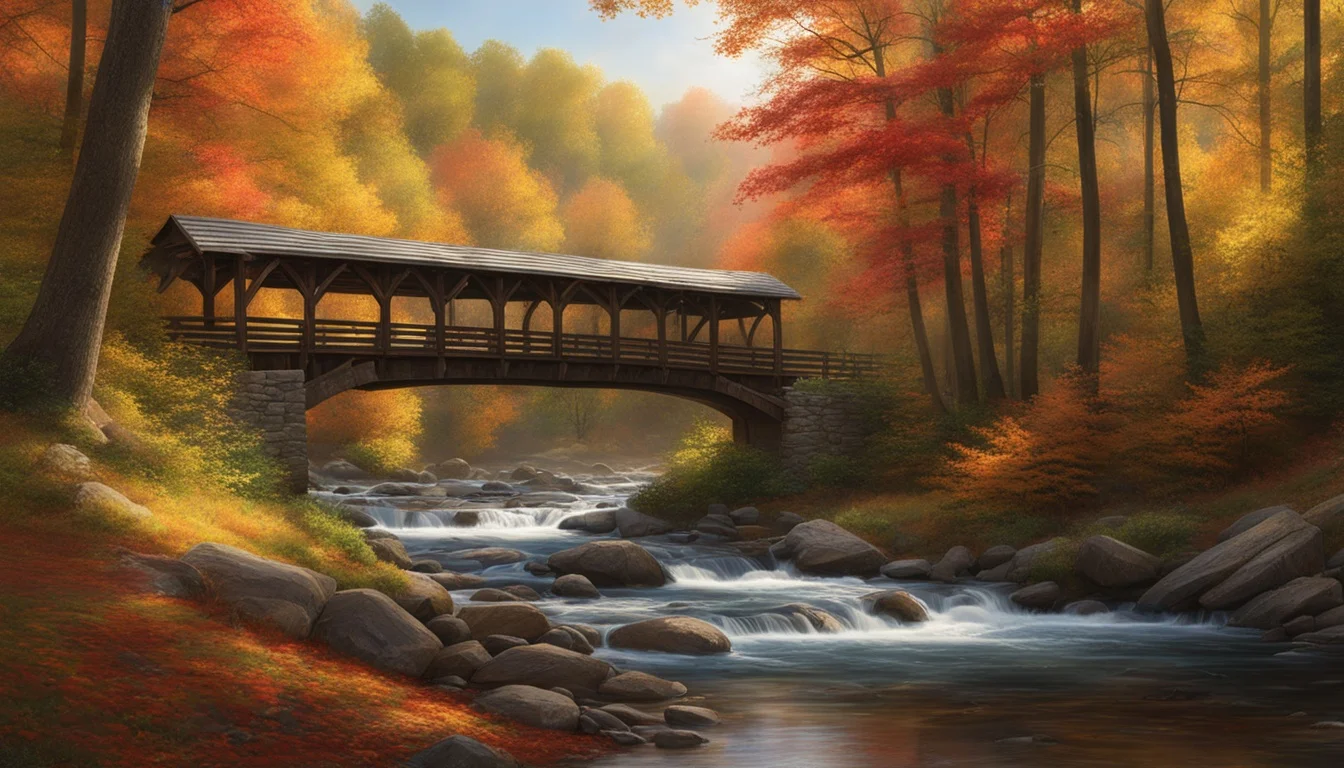Crossing Time: A Tour of Indiana’s Historic Covered Bridges
Ever thought about going back in time to see Indiana’s historic covered bridges? We’ll take you on a journey to these charming landmarks. You’ll learn about their history and see their beautiful designs.
Indiana has many covered bridges that are more than just crossings. They’ve been around for a long time and they tell their own stories. For example, the New Brownsville Covered Bridge was built in 1840. Then there’s the Williams Covered Bridge, with two spans, the longest in Indiana.
On your adventure, you’ll see amazing craftsmanship. The bridges’ wooden trusses and old, worn look will make you feel like you’ve stepped into the past.
Ready to explore Indiana’s rural treasures? Come with us to learn about the history and mysteries of Indiana’s covered bridges.
Key Takeaways:
- Indiana is home to a collection of historic covered bridges that are a testament to the state’s rich heritage.
- These bridges showcase unique architectural features and have stood the test of time.
- Each covered bridge has its own story and contributes to Indiana’s rural charm.
- Join us on a journey through the history and beauty of Indiana’s covered bridges.
- Discover the craftsmanship and attention to detail that went into building these iconic structures.
The Path of the Covered Bridge Loop Trail
The covered bridge loop trail in Indiana is a stunning road trip. It crosses six counties and lets you see nine covered bridges. Each one has its own story and beauty. It’s a great way to experience rural Indiana.
First up is the New Brownsville Covered Bridge. It’s also known as the Clifty Covered Bridge. This bridge lets you cross the White Water River. Built in 1840, it shows off Indiana’s heritage. With a lovely red look and unique truss, it’s a must-see.
Exploring the Unique Bridges
Next, the trail takes you to the West Port Covered Bridge. This bridge is special because of its windows. They add a unique touch and let in natural light.
The trail lets you see Indiana’s mix of covered bridges. You’ll find bridges from the 1800s and others with interesting designs. It’s a trip that history lovers and road trippers will enjoy.
As you keep going, you’ll reach more bridges. This includes the Scipio, James, Shieldstown, Medora, Williams, Ramp Creek, and Bean Blossom bridges. They all have stories that show Indiana’s history and bridge architecture.
Unveiling Indiana’s Counties
This trail shows off the beauty of six Indiana counties. Moving from one bridge to the next, you’ll enjoy the scenery and local culture. It truly is the heart of rural Indiana.
- Jefferson County
- Jennings County
- Ripley County
- Jackson County
- Lawrence County
- Monroe County
If you love road trips or are looking for adventure, check out this trail. You’ll see amazing bridges and explore Indiana’s county history. It’s a journey filled with charm and natural wonders.
Historical Significance of Indiana’s Covered Bridges

Indiana’s covered bridges in Indiana County are famous. They show the region’s history and skill in building from the 1800s.
The Campbell’s Mill Bridge was built in 1804, making it the first Indiana County bridge. It spans about 180 feet. Its tough build and long life represent the county’s first steps and push for growth.”
The Blairsville toll bridge is also important. The PA General Assembly allowed it in 1821. It was key for trade for over 50 years. Even though it stopped being used in 1874, it remains a valuable part of Indiana County’s story.
To learn more about Indiana County’s bridges, check out “Country Crossing… Indiana County’s Covered Bridges.” It’s by the Indiana County Genealogical & Historical Society. The guide has the history, how they’re built, and stories about the bridges. You can buy this book at the Society’s Museum in Indiana, PA.
Notable Covered Bridges in Indiana County
| Covered Bridge | Construction Year | Length (Approx.) |
|---|---|---|
| Campbell’s Mill Bridge | 1804 | 180 feet |
| Blairsville Toll Bridge | 1821 | N/A |
Indiana County’s covered bridges bring us back to the past. Their role in history and beauty honor Indiana County’s legacy.
Conclusion
Indiana County is known for its historic covered bridges, highlighting the area’s depth in history. Yet, when it concerns the “Covered Bridge Capital of the World,” Parke County is at the forefront. Parke County boasts 31 charming bridges, giving visitors a chance to witness these iconic structures up close.
To truly understand the title, consider grabbing the Parke County map before setting off on your adventure. This journey will lead you to the most mesmerizing covered bridges in the world. Whether it’s in Indiana County or Parke County, these bridges have become symbols of the state’s history and its rural allure.
Make sure you see Indiana’s covered bridges up close. They not only showcase amazing engineering but are also surrounded by breathtaking landscapes. There’s beauty and a sense of nostalgia in these structures that is truly unforgettable.






